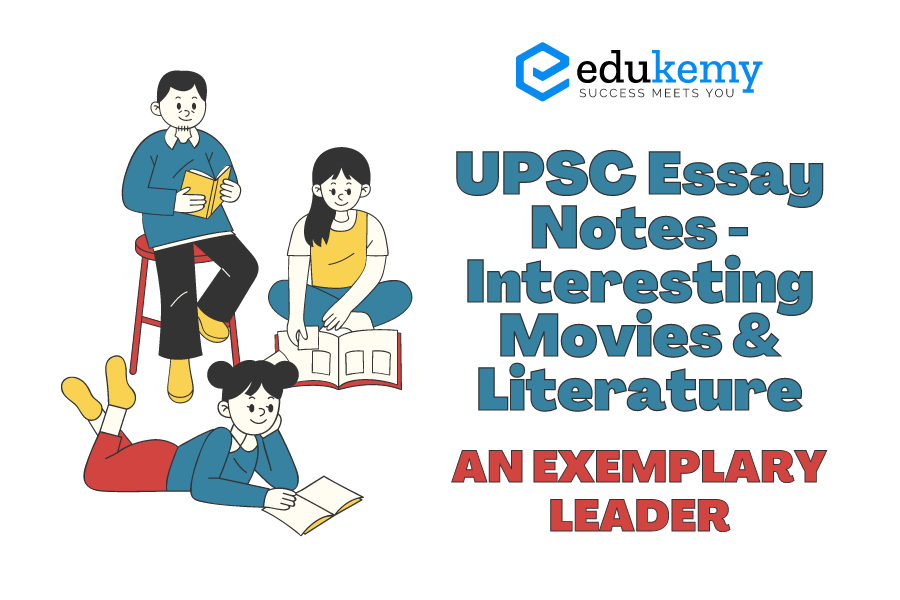
In the vast tapestry of human culture, certain movies and literary works stand out not only for their entertainment value but also for their profound insights into the human condition and leadership. These masterpieces delve deep into the complexities of human nature, offering valuable lessons on leadership, resilience, and the pursuit of excellence. From the epic tales of courage and sacrifice to the intimate portraits of visionary leaders, they inspire and empower audiences to aspire towards greatness. In this essay, we will explore how these captivating narratives serve as repositories of wisdom, enriching our understanding of what it truly means to be an exemplary leader.
We come across so many inspiring stories and great acts and achievements from scientific discoveries to socio-political
revolutions headed by great leaders. But this story is a different one. Once a scientist working at Rocket Launching Station in Thumba mustered courage to ask for a half-day leave. He approaches his boss and requests him to let him leave early for home. The reason behind this request was a promise that the scientist made to his children. That evening he had to take his children to an exhibition. Surprisingly, his boss gave him a green flag and the scientist resumed the work thereafter. All the while when the scientist was busy working on the project at hand, his boss was observing him closely. Once the work
for the day was over, the scientist looked at the watch. It was late evening already and he rushed to his house. A bit worried, he tried to approach his wife, but he could not ask where the kids were. Also, his wife acted normally as if nothing happened, and the house seemed quiet. Finally, his wife told him that his boss took the kids out for the exhibition. The boss was none other than A.P.J. Abdul Kalam.
Contents
- 1 Moral
- 2 Frequently Asked Questions (FAQs)
- 2.1 Q: What are some interesting movies and literature that can be useful for UPSC essay preparation?
- 2.2 Q: Can you provide some key takeaways from these movies and literature in the context of essay writing?
- 2.3 Q: How can these resources enhance the understanding of exemplary leadership?
- 2.4 Q: In what ways can these movies and literature be integrated into UPSC essay writing?
- 2.5 Q: How can aspirants effectively incorporate insights from these resources into their UPSC essay notes?
- 3 To get free counseling/support on UPSC preparation from expert mentors please call 9773890604
Moral
- It is good to be a great person, but it is great to be a good person.
- It is not the big monetary acts that count. Rather, kindness is the greatest act of humility that matters the most.
- Being humble takes nothing but gives rewarding satisfaction and contentment.
Frequently Asked Questions (FAQs)
Q: What are some interesting movies and literature that can be useful for UPSC essay preparation?
A: Some interesting movies and literature that can be useful for UPSC essay preparation include:
- Movies:
- “Schindler’s List”: Explores themes of leadership, morality, and human resilience during the Holocaust.
- “Dead Poets Society”: Examines the importance of individuality, critical thinking, and challenging societal norms.
- “The Shawshank Redemption”: Portrays themes of hope, resilience, and the power of the human spirit in the face of adversity.
- Literature:
- “To Kill a Mockingbird” by Harper Lee: Addresses themes of justice, racial inequality, and moral courage.
- “1984” by George Orwell: Explores the dangers of totalitarianism, surveillance, and the manipulation of truth.
- “Animal Farm” by George Orwell: Analyses themes of power, corruption, and the nature of political systems.
Q: Can you provide some key takeaways from these movies and literature in the context of essay writing?
A: Certainly! Key takeaways from these movies and literature for essay writing include:
- Analysis of human behavior and societal dynamics.
- Examination of moral and ethical dilemmas.
- Exploration of historical events and their relevance to contemporary issues.
- Critical evaluation of leadership qualities and their impact on society.
- Reflection on the complexities of power, justice, and social change.
Q: How can these resources enhance the understanding of exemplary leadership?
A: These resources enhance the understanding of exemplary leadership by showcasing various aspects such as:
- The importance of integrity and moral courage in leadership roles.
- Effective communication and inspiration to mobilize others towards a common goal.
- Adaptability and resilience in the face of challenges.
- Empathy and understanding towards diverse perspectives.
- Ethical decision-making and accountability in leadership positions.
Q: In what ways can these movies and literature be integrated into UPSC essay writing?
A: These movies and literature can be integrated into UPSC essay writing by:
- Providing real-life examples and case studies to support arguments.
- Offering diverse perspectives on complex socio-political issues.
- Illustrating principles of leadership and governance in practical contexts.
- Stimulating critical thinking and analysis of historical and contemporary events.
- Enhancing the depth and richness of essay content through literary references and cinematic narratives.
Q: How can aspirants effectively incorporate insights from these resources into their UPSC essay notes?
A: Aspirants can effectively incorporate insights from these resources into their UPSC essay notes by:
- Summarizing key themes, characters, and plot points.
- Drawing parallels between the narratives and real-world scenarios.
- Analyzing the relevance of literary and cinematic works to contemporary challenges.
- Extracting quotes and examples to support arguments and viewpoints.
- Reflecting on personal interpretations and lessons learned for holistic understanding.
To get free counseling/support on UPSC preparation from expert mentors please call 9773890604
- Join our Main Telegram Channel and access PYQs, Current Affairs and UPSC Guidance for free – Edukemy for IAS
- Learn Economy for free- Economy for UPSC
- Mains Answer Writing Practice-Mains Answer Writing
- For UPSC Prelims Resources, Click here

